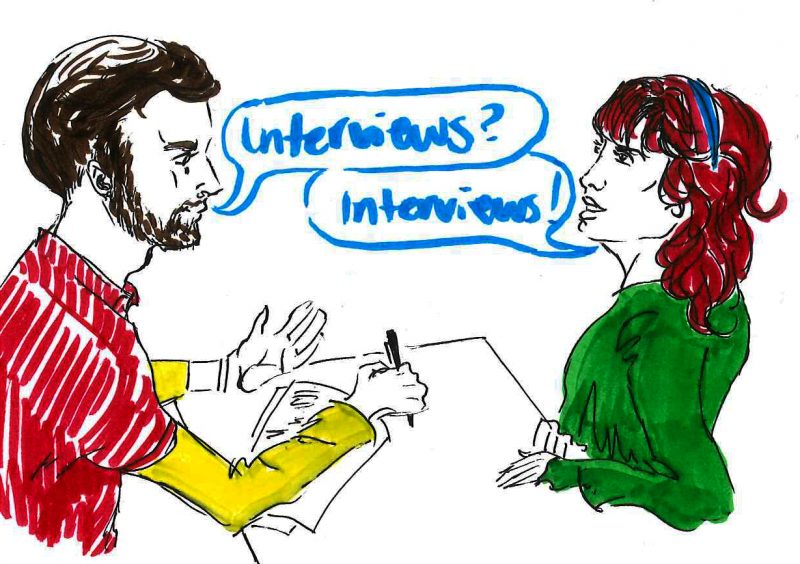Recently a colleague asked me for pointers on how to talk to the Trinitonian. It’s a great question and hints at the trepidation some have when faced with being the subject of an interview. People want to show they are smart, reasoned and caring. That said, here are some tips for my colleagues when the spotlight turns toward them:
SAY “YES” TO INTERVIEWS
The best way to manage the flow of accurate information is to offer it. Avoiding interviews makes people think there is something to hide. Even worse is saying, “No comment.” It makes reporters more suspicious.
You can refer reporters to additional/different/better sources if they are requesting you to comment on something out of your wheelhouse.
BE ACCESSIBLE
The students are very busy, so they’ll appreciate it if you take calls outside of normal hours or send a quick email response to follow-up questions. It may behoove you in the long run.
YOU DON’T HAVE TO ANSWER EVERY QUESTION
You need to be honest, but aren’t under oath and aren’t required to answer things that are off limits. I like to talk in generalities when this happens: “What a lot of campuses face is…”
THE PAPER IS A VALUABLE CONDUIT OF REAL NEWS
Transparency, communication and the exchange of information are critical to the media and our paper is no different. Being in the hot seat can be difficult, but explaining one’s self and decisions is important.
IT’S ALL ABOUT STUDENT LEARNING
The Trinitonian is not only a service, but an educational vehicle for students. Nearly everything we do here is about student learning. Reporters are sometimes nervous to talk to adults and can be guarded at best, blustery at worst. Believe me, it is tough when a reporter makes mistakes at the expense of your reputation and career. Get over it though.
KEEP PERSPECTIVE
It is easy to think that what we do is soooo important. Sometimes it is. But we are a small campus in South Central Texas and mostly nobody else cares. Polar ice caps are melting, the rich are getting richer and world leaders with weapons of mass destruction are assigning nicknames to one another. We are not all that.
YOUR QUOTES ARE LESS INTERESTING THAN YOU THINK
It took me a while to figure this out. I realized that usually people glance through stories, get the drift, and then check their iPhones. The quote you obsess over is probably of very little consequence. Out of a 20-minute interview you will probably have two or three quotes — tops. And reporters will just be using you to weave their narrative.
LET REPORTERS RECORD YOUR INTERVIEW
Everyone wins. My fear used to be that I would be misquoted. Now I fear I will be quoted accurately. “Did I really say that?”
TRY TO BE INTERESTING
I try to drop in an outlandish nugget in every interview. Unfortunately, few get published, either out of the reporter’s respect for my reputation, or because they didn’t think I was as amusing as I did.
YOU CAN GO OFF THE RECORD
All you have to do is say, “Can I go off the record?” Sometimes this is important when a reporter is sniffing around an angle that isn’t accurate, and some stories are nonstories and you can derail them by being honest. It makes you feel really important to lean in, look side-to-side, and say, “Off the record … ” (But that’s just between us).
YOU CAN’T PROOFREAD THE STORY
Journalists don’t want you to even ask. [Editor’s note: It’s true!] You usually can’t talk them out of using your quotes once you have spilled the beans, but if you build rapport and later get nervous about what you said, a reporter might be open to reading back your quotes to you to give you peace of mind. [Editor’s note: It’s true!]
SOMEONE WILL ALWAYS DISAGREE WITH YOU
The reporters are taught to cite multiple sources. Sometimes you are a primary source or a secondary source. There will always be a student quote that makes you seem like you know nothing. This is done in the name of balance. Get used to it.
LET IT GO
From time to time, people will write back for clarification and occasionally without much grace. The more you keep a story going the more life it has. Don’t feed the fire.
FINALLY: UNDERSTAND THE ROLE OF THE ADVISOR
Katharine Martin regularly reviews students’ work after it is published but she doesn’t review content in advance unless the students are seeking her help. This is critical so the press is seen as independent from censorship. It creates an authentic and valuable learning experience, and one we can share by being competent and interesting interview subjects.







